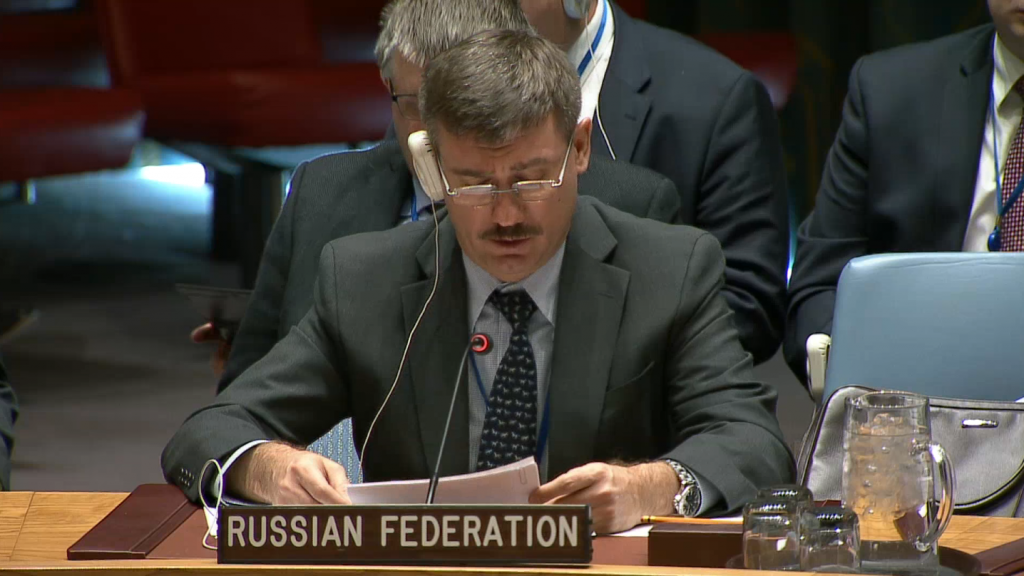Statement by Mr. Petr Iliichev, Chargé d'Affaires, at the Security Council on the Sudan and South Sudan
We thank the Special Representative of the Secretary-General, Mr. Shearer, for the information he provided on the situation in South Sudan. We pay due tribute to our colleagues from the Secretariat, who have yet again presented a balanced assessment of the situation in their monthly report.
We note the deployment of the advance team of the Regional Protection Force (RPF), which began in May. It is our understanding that the general timetable for deployment is being adjusted, but that is not the fault of the South Sudanese. Juba has remained constructive regarding the matter of the RPF, as demonstrated by the Government’s decision to provide land parcels for the deployment of the force. We call upon the Secretariat to continue to engage with Juba so as to resolve all pending issues in connection with the United Nations Mission in South Sudan (UNMISS), including the creation of mechanisms for the swift resolution of visa issues and the definition of arrangements for the deployment of the RPF while upholding the basic principles of peacekeeping.
We share the concern of colleagues regarding the disastrous humanitarian situation in the country and note the efforts made by the United Nations to improve it. We appeal to all sides in South Sudan to ensure conditions conducive to the provision of humanitarian assistance to those in need, and we welcome the measures taken by the Government to provide humanitarian access to food-insecure regions.
We would be remiss were we not to note the assistance provided to South Sudan by neighbouring countries, in particular the Sudan, which has opened border crossing points, and Uganda, which is hosting a significant number of refugees from South Sudan. We would like also to emphasize that the root causes of the famine in a number of provinces in South Sudan are not just human-induced. In some areas, just like in neighbouring Somalia and Kenya, famine is due to adverse weather conditions. Representatives of international humanitarian organizations have spoken about this issue as well.
We share the view that stabilization in South Sudan is possible only if a full cessation of hostilities is ensured and an inclusive political process launched. In this regard, we welcome Salva Kiir’s announcement, in the framework of the implementation of the peace agreement, to conduct nationwide dialogue. We also welcomed the recent oath-taking by members of the executive committee. It is our hope that the Government and the opposition will take measures to make this process more inclusive.
We welcome Salva Kiir’s declaration of a cessation of hostilities. We hope that this decision will be implemented and call upon the opposition to take analogous measures. We note the personal efforts of the Secretary-General, António Guterres, to find a solution in South Sudan. We support the African Union-United Nations-Intergovernmental Authority on Development (IGAD) coordination initiative aimed at ensuring peace, stability and security in South Sudan. It is our hope that in the near future this cooperation will take shape on the ground.
It is encouraging to note that more active and coordinated efforts are being made by regional players for a settlement in South Sudan. We hope that the UNMISS working group on hate speech will continue to work effectively. We would like to remind colleagues of the relevant provisions of resolution 2327 (2016), namely, on the need to curb such incitement on their territories through the use of social networks.
Given the general situation in the country, the Russian delegation today supported the adoption of Security Council resolution 2353 (2017), which extends the sanctions regime against South Sudan. Our position regarding a hardening of sanctions measures has not changed. Solid peace in South Sudan is not going to be brought about by a Security Council arms embargo but, rather, by progress towards a political solution as well as by targeted measures for the disarmament of civilians and the demobilization and reintegration of combatants. We also believe that there is a need to heed the views of regional leaders to the effect that discussions on the levying of additional restrictions on Juba would be untimely.
Against this backdrop, we call attention to the duplicity of the approaches of certain colleagues who in this Chamber loudly champion an arms embargo, but, outside of it, bring pressure to bear on the independent experts of the Security Council Committee established pursuant to resolution 2206 (2015) concerning South Sudan who are investigating their possible involvement in providing weapons to South Sudan.
